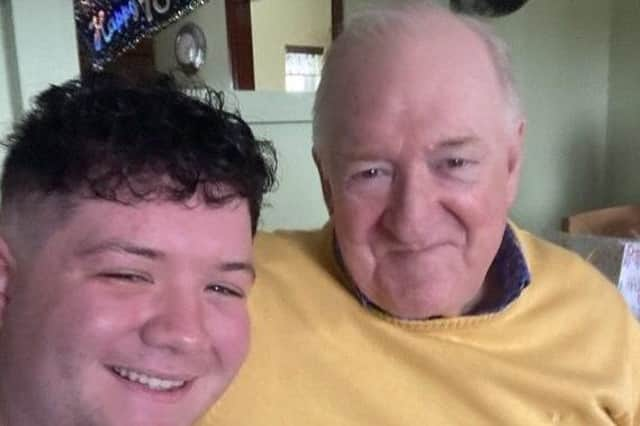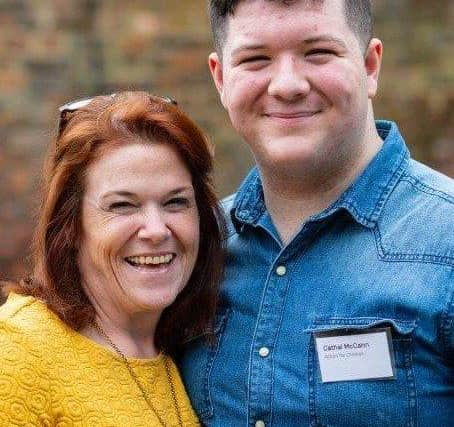‘Children are genuinely worried about the world we’re going to leave them’


With vast numbers of children concerned about ‘adult issues’ including family finances, most parents and grandparents in Northern Ireland fear childhood is getting worse.
Action for Children with YouGov polled three UK generations – quantitative surveys of over 5,000 children and adults - to explore the biggest issues affecting childhood post pandemic in a revisit of its landmark study from 2019.
Advertisement
Hide AdAdvertisement
Hide AdOne of those family’s was Mandy, 50, (mum), Cathal, 18, (son) and Dessie, 73, (grandfather) who live in Ballynahinch. Cathal was supported by an Action for Children mental health service, the Blues Programme.


Mandy explained: “I think childhoods today are so much worse than when I was younger. I’m afraid to say I don’t like children to have social media. It makes everything a competition where everything has to the best of the best – this is the hardest bit for children these days, the peer pressure.
“I really worry about their mental health – they can be so fragile and you’re afraid of what to say - it’s all the world of worry for us as parents. Cathal is in his last year at school studying for his A-Levels – it should’ve been his final year last year but because he had such struggles with his mental health, he’s had to re-do the year.
“Up until he came out as gay, it was a really scary time, he had a difficult time emotionally. I think his mental health problems wouldn’t have been anywhere as bad if there hadn’t been social media. There’s so much they shouldn’t be able to see but they can - horrible things that shouldn’t be allowed for young minds.”
Advertisement
Hide AdAdvertisement
Hide AdAcknowledging the cost of living increase, Mandy outlined: “I would like the government to bring the price of fuel down and provide much more support for families worse off than us. There are going to be so many more homeless people on the streets. I worry there’ll also be more families breaking up as a result too – if there’s no money there’s always friction - and that’s devastating for their kids.”
While Mandy worries about social media, however Cathal believes social media helped him and his friends through the pandemic.
Mandy continued: “He’s a different person now he’s come out – and he has the love and support of all his family, and he knows that. It was only due to the Blues Programme Action for Children ran at his school that we found out and were able to help Cathal with all his problems.”
Cathal said: “It has been hard these past few years for me and my friends, we didn’t get to see each other for months on end. For a lot of us we struggled because we just didn’t know if we were going to get through the lockdowns - it seemed the way the world was, it was never going to end.
Advertisement
Hide AdAdvertisement
Hide Ad“A lot of my friends struggled but it was social media that was actually the thing that kept a lot of people sane. It kept us all connected – we made sure everyone was in contact though group chats and invited to go on walks. It was a lifesaver for actually getting out the house when we could and we were able to see everybody, even if at a distance.
“I really do think there’s not enough being done by governments for young people and the support they need. There’s very little support for rural areas especially – there are no youth clubs around my hometown now or when I was growing up – and it’s such a shame as what they provide is incredible.”
Highlighting the situation in Ukraine Cathal explained: “The war in Ukraine is horrific – and especially being Irish you can understand and sympathise with them being bombed out of their home – how this country was helped by so many people shows the importance of how we need to give back and support Ukraine. For my mum and grandad, they were brought up in the Troubles – they didn’t feel safe going out and they didn’t want to travel as there was a stigma about where they were from.”
However Dessie believes some aspects of childhood are better now, but he believes that with all those opportunities comes more pressure: “Social media bullying is a big problem and the curse of drugs especially – I had never any of those dangers. It’s tougher for kids now in that they have to find their own feet from a very early age.
Advertisement
Hide AdAdvertisement
Hide Ad“Children are genuinely worried about the world we’re going to leave them – climate change is the bigger picture at the moment. I don’t think governments are picking up on the issues they face – they’re not serious about their future.
“Children have to be listened to – and be seen to listened to. They want the same chance at life – governments have to be serious about their issues. Parents are really worried too - how they’re managing with kids who don’t have the kind of life they know they should have – parents finding it tough to feed them and meet the rents.”
Dessie sees climate change and mental health as the biggest issues for children: “We have to do more for them. Kids to me they want to see a brighter future. Governments need to wake up.”
Lorna Ballard, national director for Action for Children in NI, agreed: “It is the fundamental responsibility of any government to make sure every generation of children has a better childhood and a brighter future than the last. We are deeply concerned about families and children facing impossible choices each day because they don’t have enough money to deal with these economic shocks.
Advertisement
Hide AdAdvertisement
Hide Ad“Day in, day out our frontline staff support children grappling to see how they fit into our complex world – navigating big issues including financial worries, climate change and the pandemic. Sadly, since we conducted our research, intensifying money worries and the war in Ukraine will leave children feeling the world is a gloomier place.
“The likely fall-out of the Ukraine conflict with even higher energy bills and inflation rates not seen for a generation, is a double blow for low-income families, already locked in a crippling cost of living crisis. The pandemic also continues to hang heavy, and its impact will be felt long into children’s futures.
“The Executive needs a clear plan to reduce child poverty and it can take immediate action to support those on the lowest incomes by making sure benefits keep pace with the soaring cost of living in the tough months ahead. There are political decisions that need to be made in Northern Ireland to protect families and children & prioritise their wellbeing. We want to see policies and political leadership that is committed to creating a brighter future for all. This year’s election is a chance to vote for leaders who will put children, young people and their families’ needs first. If they don’t, all the evidence points to further challenges and barriers facing our hopes of a more positive future.”
With NIESR Research predicting that the combined effect of higher prices and higher taxes will push up to 25,000 NI households into destitution at a rate more than double that of anywhere else in the UK, Sheena McMullen, campaigns, advocacy and policy advisor for Action for Children in Northern Ireland believes it is clear that urgent, local and targeted support is needed to stabilize family incomes during the next mandate in Northern Ireland.
Advertisement
Hide AdAdvertisement
Hide AdShe concluded: “Short-term emergency funds can’t be our default going forward. We need a stable political environment with leaders across the political parties committed to investing in social security policies that protect families. This will reduce stress and mental health concerns across the generations, lessen food insecurity and the reliance on food banks, tackle climbing rates of homelessness and children entering care, improve developmental, educational and health outcomes for infants, children and young people- and crucially not set limits on their potential and hope of a brighter future.”
Action for Children survey
The Northern Ireland children surveyed said their top issues preventing them from fulfilling their potential were the impacts of the Covid-19 pandemic (45%), pressure from school (39%) and poor mental health (36%).
Their top five worries were: Them or their families catching Covid (47%); pressure from school (42%); their own mental health (38%); their physical appearance (37%); and having disagreements with friends (32%)
Two years on from the first national lockdown, mental health is now a much bigger worry for children surveyed in NI with less than a quarter (23%) seeing their own mental health as an issue in 2019, compared to 38% in 2022.
Advertisement
Hide AdAdvertisement
Hide AdAnd parents and grandparents surveyed in NI are now more attuned to their child or grandchild’s mental health than they were back in 2019. Then, only 24% of parents and 5% of grandparents recognised mental health as a worry – compared to nearly half (47%) of parents and over a third (35%) of grandparents surveyed today.
Covering up a worry is common for children in NI with over half (55%) of those surveyed admitting to hiding worries from their parents. Again, parents appear more in tune, with 61% of those surveyed believing their child keeps their worries hidden from them – up from 46% pre-pandemic in 2019.
Encouragingly though, children surveyed in NI do feel more optimistic about their own prospects, with over a third (34%) believing they will have a brighter future than their parents. Pessimism grows through the generations however, with parents (38%) and grandparents (47%) more likely than children (26%) to say their child or grandchild won’t have a brighter future.
Only 34% of children surveyed in NI responded that they felt that their childhood was better compared to when their parent/carer was their age. Only a fifth of parents (20%) and grandparents (19%) surveyed thought that growing up in NI was better today than in the past, with the majority (56% parents and 60% grandparents) concluding that childhoods today were worse.
Advertisement
Hide AdAdvertisement
Hide AdUnpacking these statistics further, Sheena Mcmullen, campaigns, advocacy and policy advisor at Action for Children in NI explained: “In the Northern Irish context, a generation of “peace babies” - those born around or after the 1998 Good Friday Agreement - and their elders relied on the promise of a “peace dividend” materialising and reversing social and economic inequalities that defined the era of political conflict.
“However, the reality in 2022 is that the impact of austerity, unstable local institutions and a global pandemic has ensured that poverty, inequality and inadequate access to services including mental health support, remain a huge barrier to many children and young people growing up in NI.”
The older generations and children surveyed in NI were also clearly divided when it came to social media use. More than half of parents (56%) and grandparents (59%) polled felt that too much time spent on devices and social media would make it more difficult for children to fulfil their potential – around a third of children (36%) agree.
The findings are published as Action for Children launches its new Star in Every Child campaign to help its key workers deliver life-changing support to vulnerable children and give them a bright future.